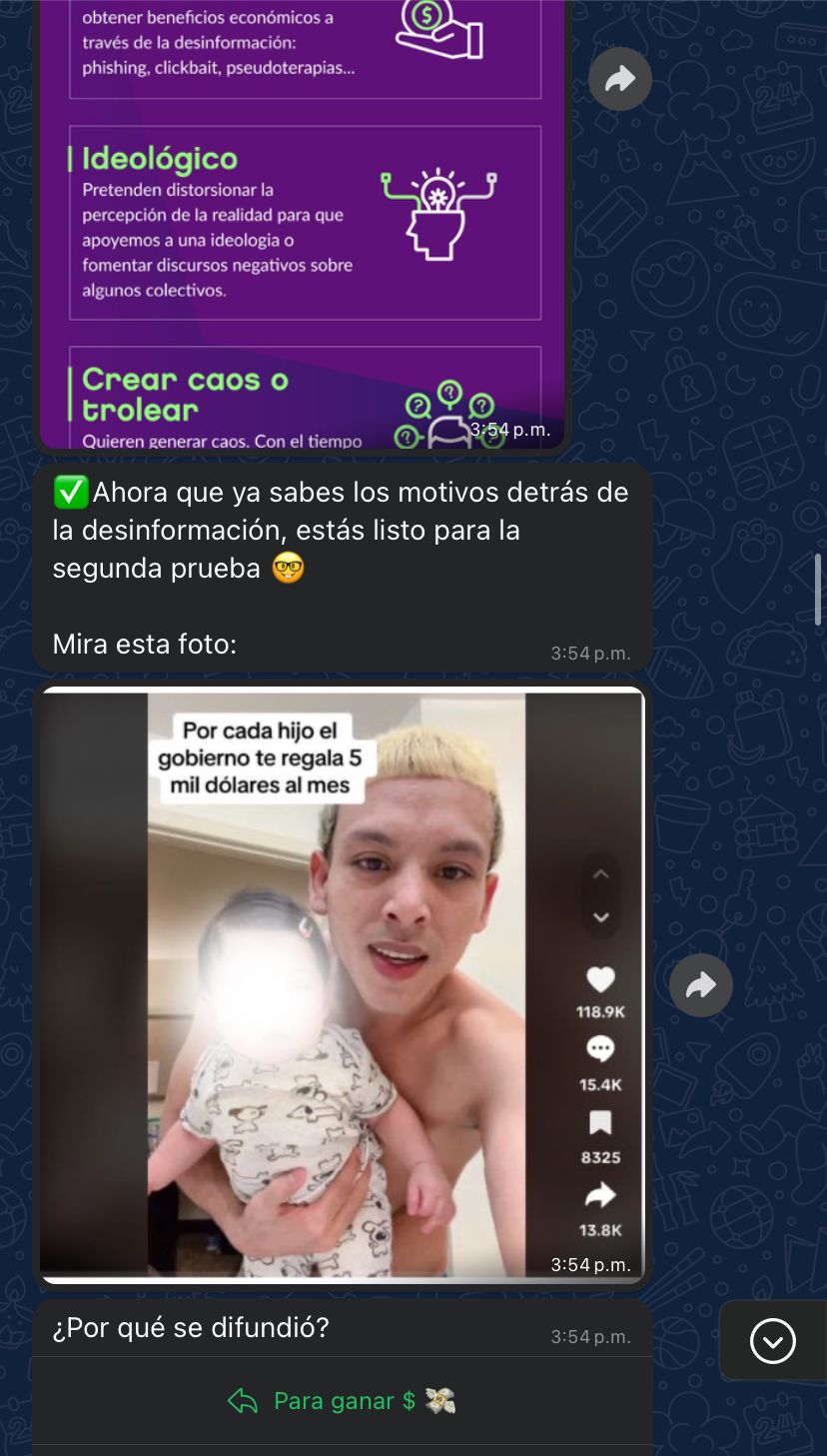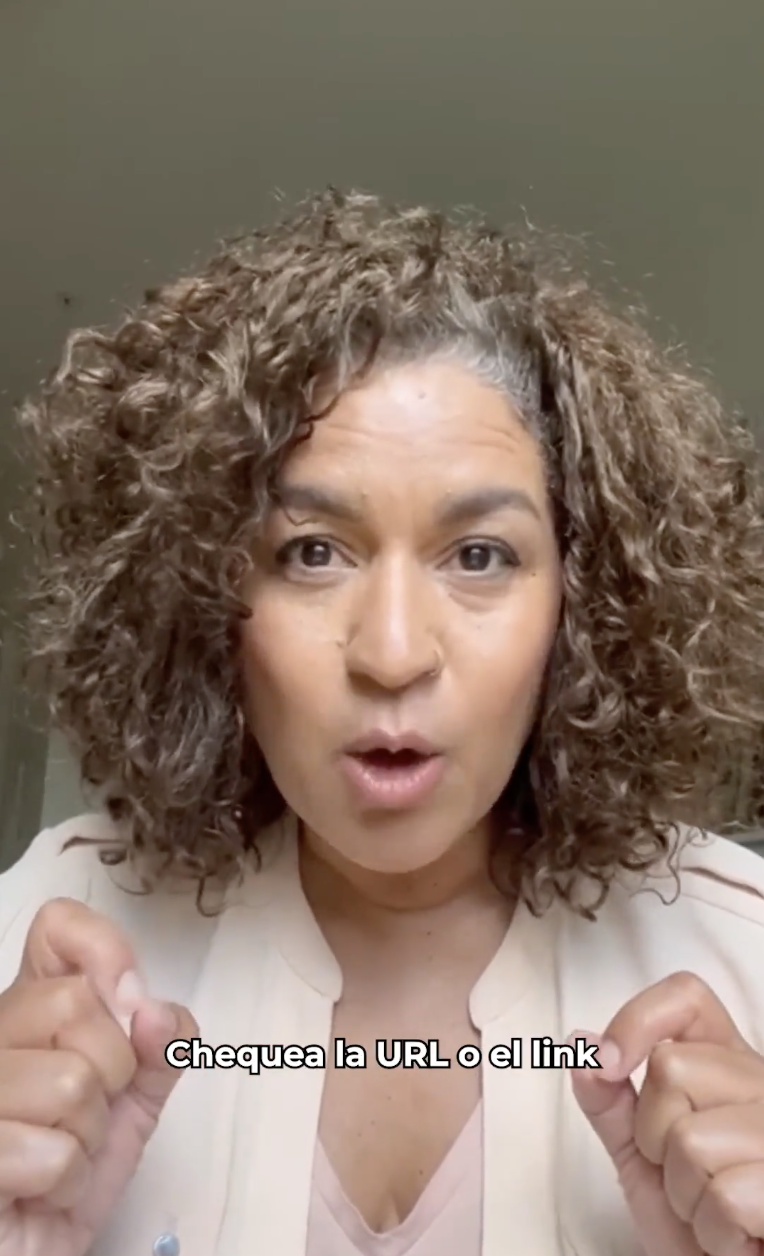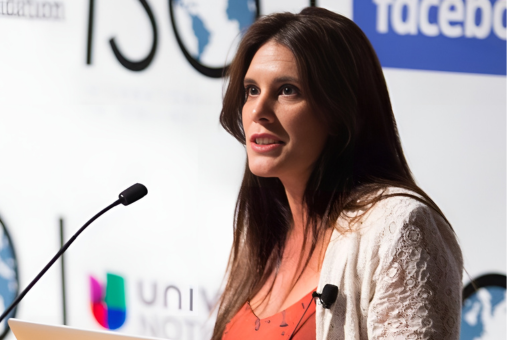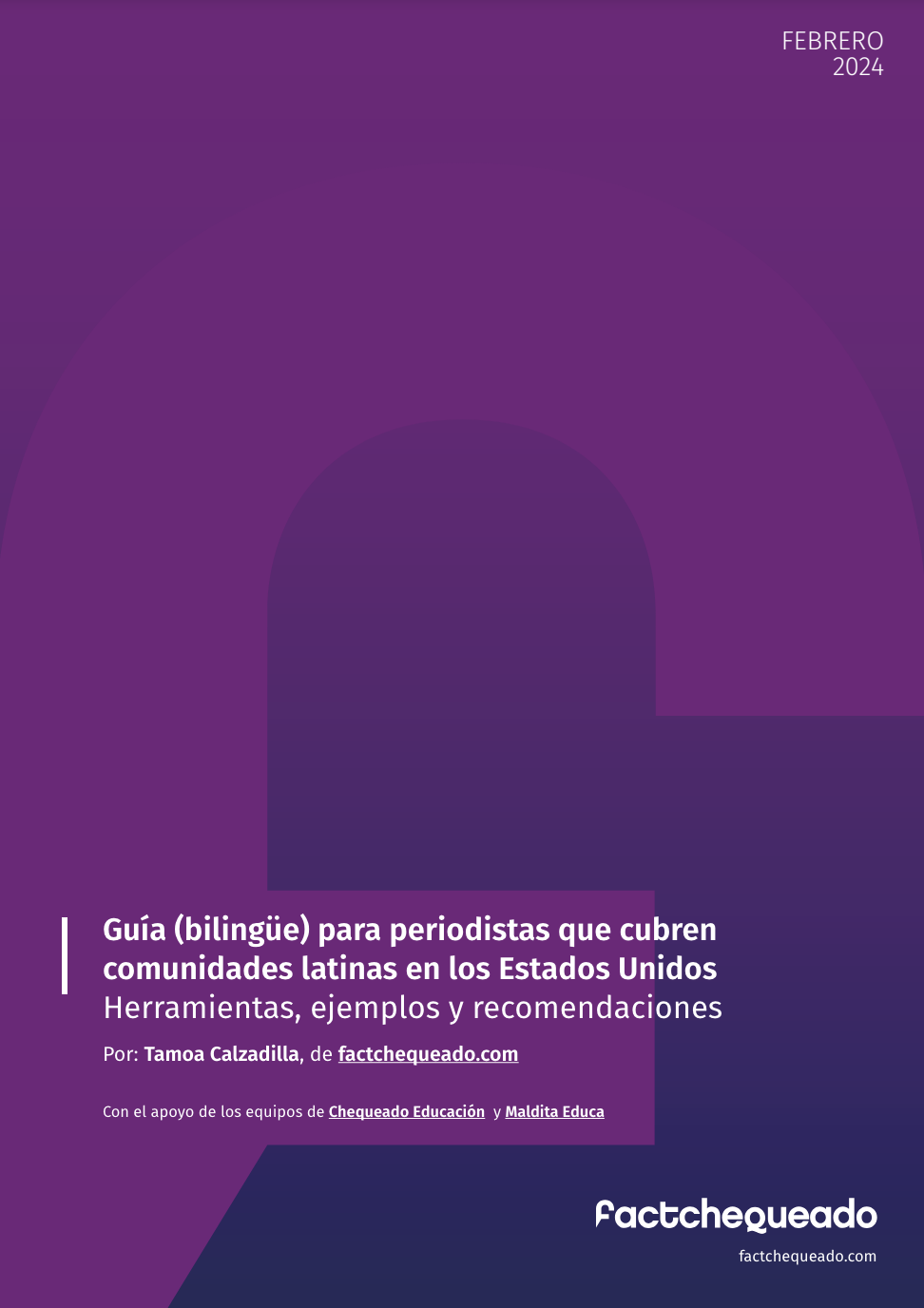To combat misinformation in Spanish during an election year in the United States, it is not enough to translate the efforts of English-language media and organizations in that country. A cultural approach is also required to help understand the misinformation narratives that specifically affect Spanish-speaking communities.
This is according to the team at Factchequeado, the fact-checking initiative that emerged from an alliance between organizations Chequeado, from Argentina, and Maldita.es, from Spain. It works to counteract misinformation in Spanish that spreads in the U.S.

#FactChallenge includes questions to identify misinformation, differentiate fact from opinion and understand bias, among other skills. (Photo: Screenshot of #FactChallenge)
“We feel that there is not enough quality media and quality sources for Spanish speakers living in the United States. It's not just the language, it's that you need examples of what happens here. We talked about the elections in the United States being very different from those in any Latin American country, so the Latino here feels a little lost,” Tamoa Calzadilla, editor in chief of Factchequeado, told LatAm Journalism Review (LJR).
With this understanding, Factchequeado has prepared a series of initiatives, which include an interactive course on WhatsApp and a bilingual guide for journalists, to try to shield Spanish-speaking communities in the U.S. from misinformation on multiple fronts ahead of presidential elections on Nov. 5.
Laura Zommer, co-founder and CEO of Factchequeado, said it’s not just quality media in Spanish that are insufficient in the U.S.; the country is also lacking journalists who specialize in fact-checking in Spanish. For this reason, part of the organization's efforts are focused on the audience learning to distinguish false news for itself through media literacy initiatives.
“No matter how many journalists, how many fact checkers, how many specific initiatives there are, they will never be enough. The long-term strategy is for audiences to be more critical and have more skills,” Zommer told LJR. “Misinformation is not going to end, artificial intelligence is going to enhance what we already know about misinformation. What we have to achieve is for our audiences to have more elements so as not to aggravate the problem.”
One of those Factchequeado initiatives to develop the audience's critical thinking is #FactChallenge, an interactive course on WhatsApp that was launched on June 5, exactly five months before the elections. The tool seeks to help Latino and Spanish-speaking communities learn basic concepts of media literacy to better navigate the information ecosystem in the U.S.
The course, designed to be done in seven days –although it can be completed in less time– is located on the same WhatsApp number Factchequeado uses to answer questions from the audience and help them verify content. It’s been in operation since 2022.
Developed with the support of PEN America, #FactChallenge consists of a series of questions and activities to identify misinformation, differentiate facts from opinions, understand confirmation and familiarity biases, recognize manipulated images, and learn about the role of artificial intelligence in the information ecosystem, among other skills.
“This course seeks to go to the place where Spanish-speaking Latinos in the United States are choosing to educate themselves about politics and tell them 'here is a way to train yourself so that you are not fooled so easily, to raise the cost of lying,'” Zommer said. “We are not proposing that you are going to become a fact checker, what we want is to plant the seed for any consumer of information on WhatsApp to recognize some marks or footprints that they themselves can identify in content that would lead them to doubt, suspect and avoid sharing and therefore make the problem worse.”

Tamoa Calzadilla, editor-in-chief of Factchequeado, is the instructor in some of the course videos. (Photo: Screenshot of #FactChallenge)
The content of #FactChallenge is presented in a brief and playful way, and includes lessons with images and short videos, so that users can entertain themselves and share it with their contacts. Factchequeado and its allies are promoting the product as a challenge to overcome, in the style of social media challenges.
Calzadilla stars in some of the course videos, which are produced in vertical format and with the characteristics of TikTok or Instagram Reels videos.
“We also want it to be fun, like a game because we don't want to have the tone of a teacher, of 'I know more than you,'” Calzadilla said. “We decided that we had to do something a little playful and also with videos, because you see that video and audio recordings are widely shared on that tool [WhatsApp]. We decided to mix all that in a challenge, with the language used on social media.”
Although the #FactChallenge seeks to prepare the audience for election season, none of the lessons feature political or election-related content. The reason for this is that, according to Zommer, political content usually leads to rejection or polarization on digital platforms, and that would defeat the purpose of the tool.
“Politics tends to polarize us more and lead to bias. We are proposing this course so that you are better prepared in the elections, but presenting you with cases that are not necessarily political, partisan, is part of the strategy,” Zommer said. “We want you to learn the skills and then apply them during the political campaigns.”
Since its founding, the journalists behind Factchequeado set out to focus their efforts on the channels and formats that Spanish-speaking Hispanic news consumers choose. And to-date, they have proven their hypothesis that WhatsApp has a very high penetration in the Latino community in the U.S. when compared to other population groups.
Latinos in the U.S. use WhatsApp to consume news and discuss political issues much more than white consumers do, according to the study “Understanding Media Habits & Engaging Latino Communities,” conducted by professors from the Center for Social Media at New York University (NYU) and the University of California, San Diego.
The study, published in April of this year, showed that 57 percent of Latinos surveyed said they regularly use WhatsApp, compared to only 15 percent of white people. The number rises to 74 percent in Latinos whose dominant language is Spanish, compared to 33 percent in Latinos who speak more English.
Thirty percent of Latinos said they discuss politics on WhatsApp, compared to 14 percent of white people. Similarly, 29 percent of Latinos said they share news content on that platform, compared to 11 percent of white people, according to the research.
“WhatsApp is the preferred tool for Latinos to communicate, both with those who live here and with our families and friends who live in our countries [of origin]. We also see how misinformation or false content circulates on this platform from Latin America to here, and from here to Latin America,” Calzadilla said. “We wanted to do training right there where people are sending things that are misinforming.”
Developing their chatbot and now the #FactChallenge on WhatsApp is in line with one of Factchequeado’s founding principles, which is to build a community that helps them identify information gaps where those who misinform sneak in, Zommer said.
Both Chequeado and Maldita.es have verified the success of this principle of community building in data verification in Argentina and Spain, respectively, for several years now, the journalist added.
“We are not going to wait for you to sign up for a course that we invite you to on a website, because many of the people we speak to work a 12-hour day or have a 3-hour commute,” Zommer said. “If we really want these people to gain more capabilities and skills, we have to go where they are.”

Laura Zommer, co-founder and CEO of Factchequeado, said #FactChallenge does not include political content because it often leads to rejection or polarization. (Photo: Mary Kang/Knight Center)
#FactChallenge was made possible thanks to a technology that Maldita.es developed during the COVID-19 pandemic, which allowed it to link its archive of verified content to WhatsApp and automate responses to its readers' questions.
Developing a WhatsApp-based tool like #FactChallenge does not represent major technological difficulties for a media outlet, but it is necessary to have a business solutions provider (BSP).
BSPs are independent technology companies endorsed by Meta, the company that owns WhatsApp, that have access to the WhatsApp Business API. This API allows an organization to link its products or services to the messaging platform and develop tools ranging from chatbots to virtual stores and automated payment systems, without the need for programming.
Factchequeado uses Botalite, the BSP that Maldita.es founded to be able to carry out its solutions on WhatsApp and which is now used by almost twenty data verification organizations in the world, including Chequeado (Argentina), La Silla Vacía (Colombia), Documented (U.S.) and Correctiv (Germany).
“What Botalite's technology allows is, on the one hand, to do fact checking: record user queries and give them automated responses if there is a match with the database of each of the fact checking organizations. And another of its features is the course that Factchequeado has just launched,” Ximena Villagrán, director of operations at Maldita.es, told LJR. “We specialize in tools to fight misinformation and for media to be closer to their communities, and that is why we have this technology.”
In addition to providing the technology, Botalite provided the Factchequeado team with the training to design and manage the course on its platform, which, Villagrán said, is quite intuitive.
Factchequeado's plan is that the first two months after the launch of #FactChallenge will be used to test the product among its nearly 80 allied media outlets and organizations in the U.S., with the aim of receiving feedback and, if necessary, making improvements, Zommer said.
The journalist said that, in general, user comments have been good, although some older people have found it difficult to find the course in Factchequeado's WhatsApp chat. To access #FactChallenge, the user must expand the menu that appears when starting a conversation in the Factchequeado chat and click on the corresponding item.
“Maybe we have to work on in-person events or in a virtual space in which we tell people to have their cell phones with them and we guide them,” Zommer said. “This also gives us the idea that there are gaps that have to do with digital literacy that we cannot ignore.”
The #FactChallenge is just one of several elements that make up Factchequeado's strategy against misinformation in Spanish ahead of U.S. presidential elections. During the first months of 2024, the organization has been developing content and tools to help its audience avoid being a victim of fake news during election season.
Another element of that strategy are the nearly 20 electoral explainers that Factchequeado has published to date, which answer questions about the American electoral system, such as what Super Tuesday is, how presidential primaries work and what the weight of the Latino vote is in that country, among others.

The guide written by Calzadilla offers tutorials on 17 useful tools for detecting false information. (Photo: Screenshot from Factchequeado)
Also, in March, Factchequeado launched the “Bilingual toolkit for journalists covering Latino communities in the U.S.,” an element that aims to provide journalists with tools to combat misinformation and understand the information needs of the communities they serve.
The guide, which was written by Calzadilla with support from the Reynolds Journalism Institute, offers tutorials on newsroom use of 17 tools available online that help detect false information. It also includes a list of reliable sources of information on key topics for the Latino community in the United States, such as migration, economy, health and security.
“This guide points to another fundamental pillar for us in elections, which is to prepare journalists who serve Latino communities, whether they have small audiences or large audiences,” Calzadilla said. “It is not a guide for fact checkers, it is a guide for any journalist who needs to confirm something or be sure of something.”
Factchequeado also has had its WhatsApp channel, “Factchequeado En Español,” since September 2023. It uses the channel to share debunked misinformation, tools to detect false news and alerts about scams circulating on digital platforms. Unlike WhatsApp chats or communities, channels are one-way and do not allow users to reply to messages they receive.
Less than a year after its launch, “Factchequeado En Español” already has 4,800 followers. Calzadilla said this channel has been the Factchequeado product on WhatsApp that has grown the fastest in terms of number of users.
“People are really valuing that when there is something, we let them know, that there is no regularity, there is no commitment like with our newsletter, which arrives every Sunday at 11:00 in the morning to your phone, but instead, when we see that there is something circulating and that it’s worthwhile, we launch it and people react, share it, and get involved,” Calzadilla said. “Of all the exercises we are doing now on WhatsApp, I would tell you that this has been the most successful in terms of production, operation.”